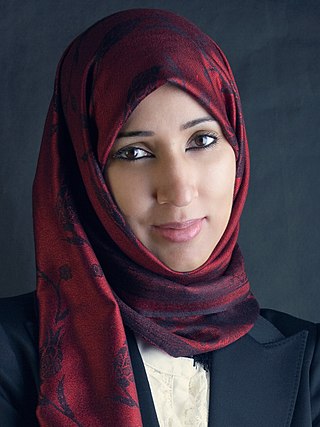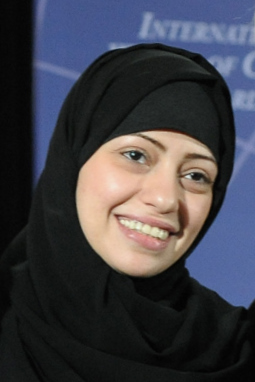
Human rights in Saudi Arabia are a topic of concern and controversy. Known for its executions of political protesters and opponents, the government of the Kingdom of Saudi Arabia has been accused of and denounced by various international organizations and governments for violating human rights within the country. An absolute monarchy under the House of Saud, the government is consistently ranked among the "worst of the worst" in Freedom House's annual survey of political and civil rights and was in 2023 ranked as the world's most authoritarian regime.

The Arabic Wikipedia is the Modern Standard Arabic version of Wikipedia. It started on 9 July 2003. As of May 2024, it has 1,232,454 articles, 2,576,455 registered users and 54,128 files and it is the 17th largest edition of Wikipedia by article count, and ranks 7th in terms of depth among Wikipedias. It was the first Wikipedia in a Semitic language to exceed 100,000 articles on 25 May 2009, and also the first Semitic language to exceed 1 million articles, on 17 November 2019.

The Ministry of Interior and General Investigation, commonly known simply as the Mabahith, is the secret police agency of the Presidency of State Security in Saudi Arabia, and deals with domestic security and counter-intelligence.
Multiple forms of media including books, newspapers, magazines, films, television, and content published on the Internet are censored in Saudi Arabia.

Khalid Kelly, born Terence Edward Kelly, also known as Abu Osama Al-Irlandi and Taliban Terry was an Irish Muslim convert and at one time the leader of Al-Muhajiroun in Ireland.

Manal al-Sharif is a Saudi women's rights activist who helped start a right to drive campaign in 2011. Wajeha al-Huwaider filmed al-Sharif driving a car as part of the campaign. The video was posted on YouTube and Facebook. Al-Sharif was detained on 21 May 2011, released, and then rearrested the following day. On 30 May, al-Sharif was released on bail, on the conditions of returning for questioning if requested, not driving, and not talking to the media. The New York Times and Associated Press associated the women's driving campaign as part of the Arab Spring and the long duration of al-Sharif's detention due to Saudi authorities' fear of protests.

Samar bint Muhammad Badawi is a Saudi Arabian human rights activist. She and her father filed court cases against each other. Badawi's father accused her of disobedience under the Saudi Arabian male guardianship system and she charged her father with adhl—"making it hard or impossible for a person, especially a woman, to have what she wants, or what's rightfully hers; e.g, her right to marry" according to Islamic jurisprudence—for refusing to allow her to marry. After Badawi missed several trial dates relating to the charge, an arrest warrant was issued for her, and Badawi was imprisoned on 4 April 2010. In July 2010, Jeddah General Court ruled in Samar Badawi's favor, and she was released on 25 October 2010, and her guardianship was transferred to an uncle. There had been a local and international support campaign for her release. The Saudi NGO Human Rights First Society described Badawi's imprisonment as "outrageous illegal detention".
The Specialized Criminal Court (SCC) is a non-Sharia court created in Saudi Arabia in 2008 that tries suspected terrorists and human rights activists. On 26 June 2011, the court started trials of 85 people suspected of being involved in Al-Qaeda in the Arabian Peninsula and the 2003 Riyadh compound bombings and in September 2011 another 41 al-Qaeda suspects appeared in the court. In the same year, the court held trial sessions of human rights activists, including co-founder Mohammed Saleh al-Bejadi of the Saudi Civil and Political Rights Association (ACPRA) and Mubarak Zu'air, a lawyer for long-term prisoners, and Khaled al-Johani, who spoke to BBC Arabic Television at a protest in Riyadh, thus becoming known as "the bravest man in Saudi Arabia". The court convicted 16 of the human rights activists to sentences of 5–30 years' imprisonment on 22 November 2011.

The following is a timeline of the 2011–2012 Saudi Arabian protests since July 2012. The 2011–2012 Saudi Arabian protests are a series of ongoing protests taking place in Saudi Arabia, which began in January 2011, influenced by concurrent protests in the region.

Mohammad Fahad Muflih al-Qahtani is a human rights activist, economics professor and political prisoner currently jailed at Al-Ha’ir Prison in Riyadh. Prior to his arbitrary 2012 arrest, he co-founded and later lead the Saudi Arabia human rights organisation Saudi Civil and Political Rights Association. Alkarama described al-Qahtani as "one of [the Saudi Arabian judiciary's] most eloquent and fervent critics". On 9 March 2013, al-Qahtani was sentenced to ten years in prison followed by a ten-year travel ban, ostensibly for "co-founding an unlicensed civil association". He has carried out several hunger strikes to protest Saudi prison conditions endured during his politically motivated incarceration. As of 2022, he remains jailed and has been intermittently kept in solitary confinement since 2018.
Dissidents have been detained as political prisoners in Saudi Arabia during the 1990s, 2000s, 2010s and 2020s. Protests and sit-ins calling for political prisoners to be released took place during the 2011–2012 Saudi Arabian protests in many cities throughout Saudi Arabia, with security forces firing live bullets in the air on 19 August 2012 at a protest at al-Ha'ir Prison. As of 2012, recent estimates of the number of political prisoners in Mabahith prisons range from a denial of any political prisoners at all by the Ministry of Interior, to 30,000 by the UK-based Islamic Human Rights Commission and the BBC.

Abdullah Hamid Ali al-Hamid (1950-2020) or Abu Bilal was a Saudi poet, Arabic professor, human rights activist and a co-founder of the Saudi Civil and Political Rights Association (ACPRA). He was imprisoned several times for calling for the establishment of a constitutional monarchy in Saudi Arabia.

Loujain al-Hathloul is a Saudi women's rights activist, a social media figure, and political prisoner. She has been arrested on several occasions for defying the ban on women driving in Saudi Arabia. In May 2018, she and several prominent women's rights activists were kidnapped in the United Arab Emirates (UAE) and deported to Saudi Arabia where they were charged with "attempting to destabilise the kingdom." Her ex-husband, Saudi stand-up comedian Fahad al-Butairi, had also been forcibly returned from Jordan to the Kingdom and was under arrest.
Israa al-Ghomgham is a Saudi Arabian human rights advocate. She is especially known for her documentation of the 2017–18 Qatif unrest.
ALQST or Al Qst is a human rights organisation that documents and promotes human rights in Saudi Arabia, with a team in Saudi Arabia that researches cases and a team in London that publishes reports and news.
Salma al-Shehab is a Saudi Arabian student and prisoner of conscience who was sentenced to 27 years in prison by the Specialized Criminal Court in what has been cited as the longest prison sentence ever given to a human rights activist in Saudi Arabia. While al-Shehab's initial six-year sentence received relatively little press, her resentencing in August 2022 received international attention and led to criticism of the Saudi Arabian government.
SMEX is a Lebanese non-governmental organization with a mission to advocate for digital rights in the Arab world. It is based in Beirut. Its executive director is Mohamad Najem. SMEX was established in 2008 as Social Media Exchange.









